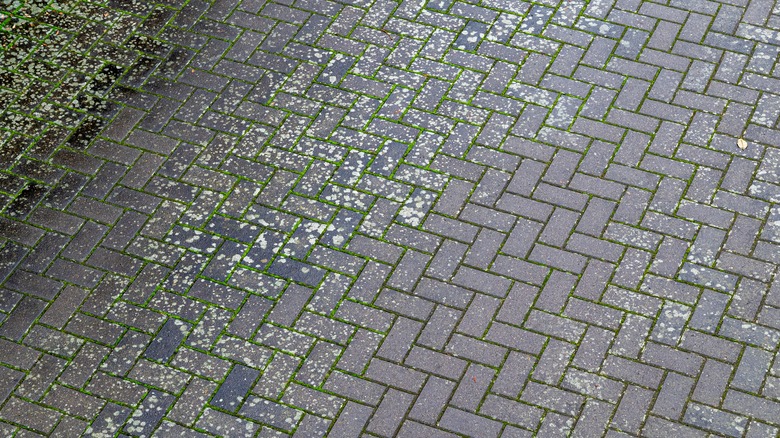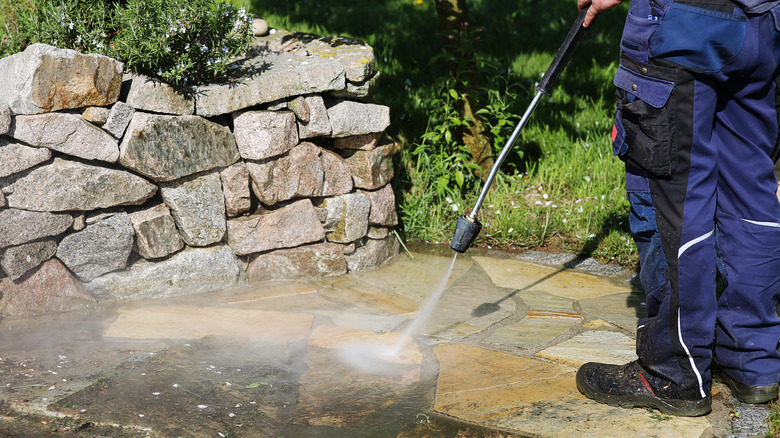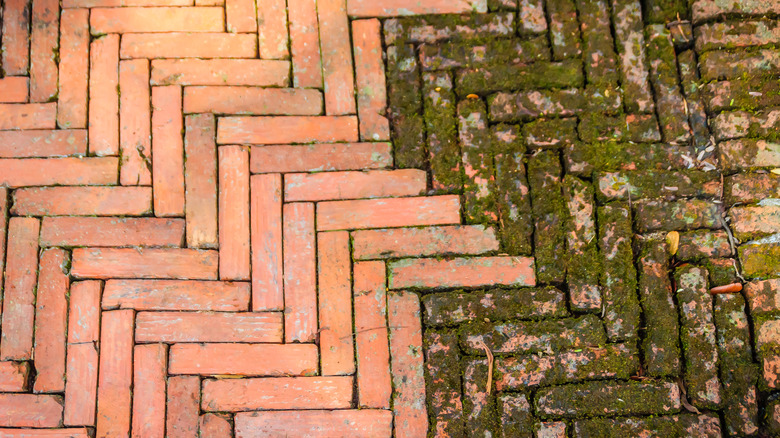The Natural Ingredient That'll Take Care Of Moss Growing On Bricks And Driveways
Moss can add a whimsical and natural touch to the facade of stones and pathways that line your property. Bricks and driveways in particular are ideal surfaces for moss growth due to their porous nature. The plant variety thrives in these areas when they're damp and shaded as they offer ample crevices for spores to settle. While moss typically won't harm the structural integrity of bricks or driveway pavers, it can become slippery when wet, creating a potential slip hazard for an unsuspecting traveler. If the woodsy aesthetic and possible physical danger aren't for you, you can easily remove the moss from bricks or driveway pavers. One easy hack to remove moss is by using an ingredient you probably already have in your pantry: a bottle of vinegar.
Vinegar is a readily available, inexpensive, and environmentally friendly solution that's much more eco-friendly than harmful commercial chemicals marketed for cleaning up unwanted vegetation. It's especially effective at removing moss due to its acidic nature. Once soaked in vinegar, the plant will die, making it much easier to clean away from the surface of bricks and driveway pavers. What's great about this option is that vinegar's acidity will also discourage the regrowth of moss on these stones, providing long-lasting results.
How to clean away moss
If you're ready to get rid of moss from the bricks or driveway pavers on your property, grab a bottle of white vinegar and get started. To determine whether you should use the vinegar directly on the moss or not, test whether the vinegar stains or discolors your bricks or pavers. Pour a little undiluted vinegar on a cloth and dab it on an inconspicuous area of the stones you'd like to clean. If you don't observe any significant discoloration, you can proceed with drenching the moss with undiluted vinegar. Should the bricks or pavers look bleached, you may want to dilute the white vinegar with water at a 1:1 ratio.
Next, add the vinegar or vinegar solution to a spray bottle and use it to drench the moss you'd like to remove. Be sure to thoroughly soak it so the vinegar can seep in and kill the moss. Once moistened, allow the vinegar to sit for at least an hour to work its way through the moss. It may take a few applications or even a couple of days for the plant to die. At this point, use a rake or shovel to gently scrape the moss from the surface of the stones and dispose of it either in your compost pile or a yard waste bag. For an even cleaner look, consider power washing the stones afterward to restore their original appearance.
Cautions for this method
While using vinegar can be a simple hack to remove moss from your driveway pavers or bricks, it's important to be aware of potential risks. Before using the vinegar (especially undiluted), be sure to test it on a small, inconspicuous area first. Depending on the type of material you're working with, they may be sensitive to acids like vinegar, resulting in damage or discoloration. For clay bricks and particularly sensitive stones, like those made of limestone, you may want to further dilute the vinegar solution from a 1:1 ratio and consider 1 tablespoon per gallon instead. This will make a gentler solution that may be more compatible with your pavers or bricks.
Another caution to consider is that the vinegar may wash away and harm nearby plants, especially if it's undiluted. Be intentional with how you spray the moss and avoid any shrubs, trees, or other vegetation in proximity. Once you've finished the process, rinse the surrounding area with clean water to help minimize the vinegar's impact on these plants. Finally, since vinegar is an acid, repeated use may weaken the grout or mortar joints in between your bricks or driveway pavers. Like with nearby vegetation, it's a good idea to thoroughly rinse the vinegar from the materials to protect their structural integrity.


